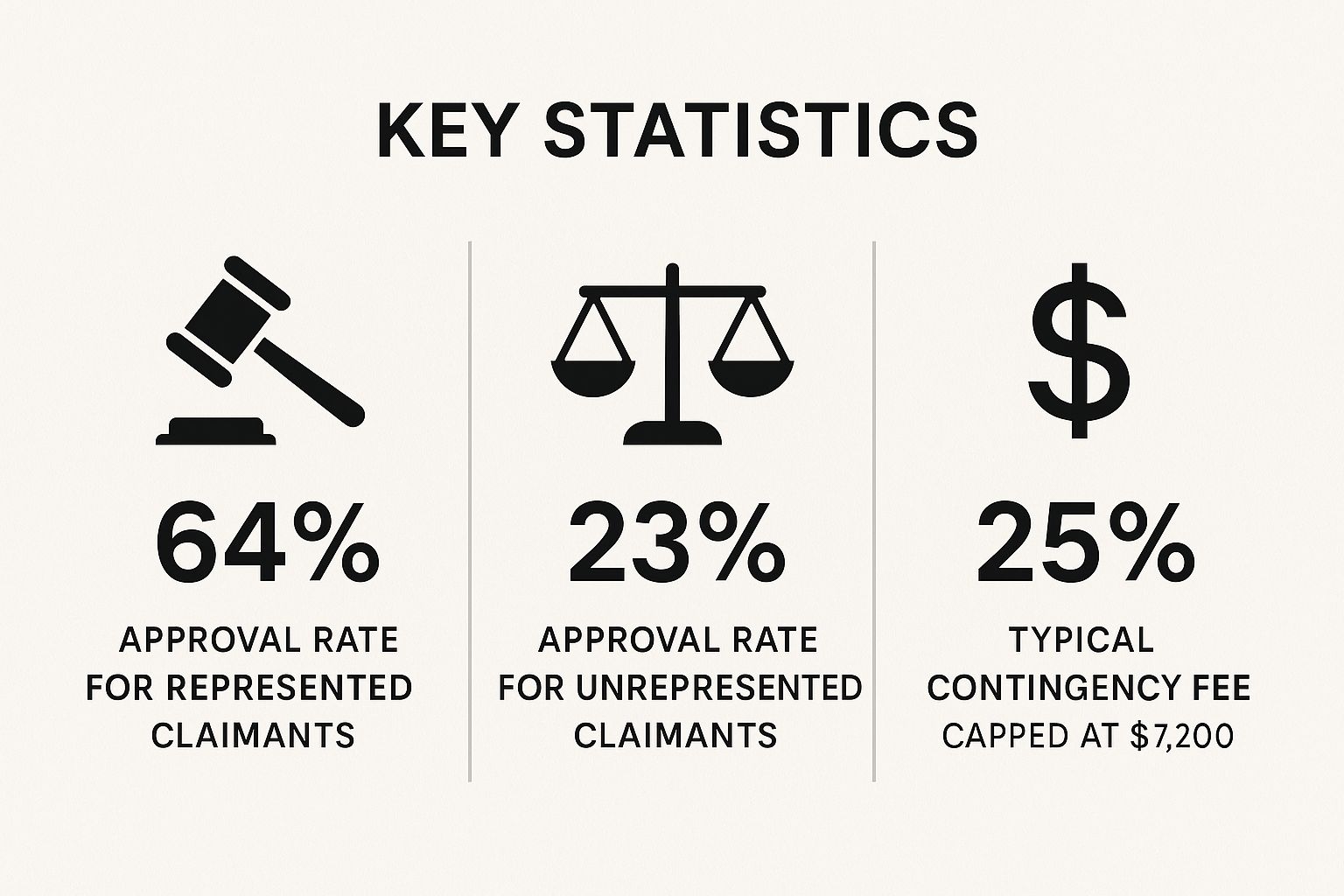Top Social Security Disability Hearing Tips to Succeed
"I was satisfied once John Bell took over my case."
"Communication was always timely."
Top Social Security Disability Hearing Tips to Succeed
Facing a Social Security Disability (SSD) hearing can be one of the most stressful and pivotal moments in your life. The outcome determines your access to vital financial support after a debilitating injury or illness has left you unable to work. In Oregon, as elsewhere, the hearing before an Administrative Law Judge (ALJ) is your best and often final opportunity to present your case.
Success isn't just about having a valid medical condition; it's about effectively proving your limitations according to the Social Security Administration's complex rules. This guide provides seven essential, actionable social security disability hearing tips designed to demystify the process, build a stronger claim, and help you present your case with clarity and confidence.
By understanding what the judge needs to see and hear, you can significantly improve your chances of receiving the benefits you deserve. We will walk you through the critical steps, from deep-diving into your medical file to navigating the nuances of expert testimony, ensuring you are thoroughly prepared for the day of your hearing. These strategies will help you articulate how your condition impacts your ability to function daily, which is the cornerstone of a successful disability claim.
1. Thoroughly Prepare Your Testimony and Review Your File
The single most impactful step you can take for your Social Security Disability hearing is to become an expert on your own case. This means obtaining and meticulously reviewing every page of your Social Security file. This file contains all the medical records, work history, and prior statements that the Administrative Law Judge (ALJ) will use to make their decision. Knowing precisely what is in your file is a crucial social security disability hearing tip that prevents surprises and empowers you to present a clear, consistent case.

This proactive approach allows you to identify and address potential issues before they become problems in the hearing room. For example, you might discover that a recent MRI showing significant spinal deterioration is missing, giving you time to submit it. Or you could find a past statement that misrepresents your ability to lift objects, allowing you to prepare a clear explanation for the judge.
How to Implement This Tip
To effectively prepare, you must be strategic. Simply glancing at your file is not enough; a deep dive is necessary to ensure your testimony aligns perfectly with the documented evidence.
- Request Your File Early: Contact the Social Security Administration or your attorney to request a complete copy of your file on a CD at least two to three months before your hearing date. This provides ample time for a thorough review.
- Create a Timeline: Organize your medical history chronologically. Note each diagnosis, treatment, and physician visit to create a clear narrative of your declining health.
- Identify Gaps and Errors: Make detailed notes of any missing medical records, inconsistencies in doctor’s notes, or errors in your reported work history. One claimant in Oregon identified a gap in their psychiatric treatment records and was able to proactively explain to the judge that it was due to a temporary loss of insurance, which preserved their credibility.
- Practice Your Testimony: Based on your file, practice explaining your limitations using simple, direct language. Prepare specific, real-world examples of how your conditions impact daily activities like cooking, cleaning, or driving.
This level of preparation is fundamental to a successful outcome. For more guidance on this critical step, you can review this in-depth guide on how to prepare for your disability hearing.
2. Be Honest, Specific, and Describe Your Worst Days
Your testimony is your opportunity to paint a clear picture of how your impairments affect your daily life. A crucial social security disability hearing tip is to focus on honesty and specificity, particularly when describing your limitations on your worst days. The Administrative Law Judge (ALJ) needs to understand the full scope of your functional deficits, not just how you manage on a good day. Avoid the natural tendency to minimize your struggles; likewise, avoid exaggeration, as both can severely damage your credibility.

The Social Security Administration’s rules focus on your consistent ability to perform work-related tasks, eight hours a day, five days a week. If debilitating symptoms prevent you from reliably functioning, the judge must know this. Focusing on your worst days is not about being dishonest; it's about accurately conveying the unpredictability and severity of your condition, which is central to proving you cannot sustain full-time employment.
How to Implement This Tip
Effectively communicating your limitations requires moving from general statements to concrete, quantifiable examples. This helps the ALJ visualize your daily reality and understand how it translates to an inability to work.
- Quantify Your Limitations: Instead of saying, “I have trouble walking,” be specific: “I can walk for about 10 minutes, maybe the length of one city block, before the sharp pain in my lower back forces me to sit down for at least 20 minutes.”
- Describe a Typical Bad Day: Walk the judge through a difficult day from start to finish. For example, a claimant in Eugene successfully explained, “On my bad days, which are about four times a week, my fibromyalgia is so severe that I cannot lift a pot to cook and must rely on my spouse for meals.”
- Explain the Consequences: Detail what happens when you push past your limits. Rather than, “I get tired easily,” explain, “If I try to do a load of laundry and the dishes on the same day, I will be in bed for the entire next day with increased pain and fatigue.”
- Use Realistic Frequency: Be clear about how often you experience these severe limitations. Phrases like “more days than not” or “at least 15 days out of the month” are powerful ways to illustrate the ongoing impact of your condition.
3. Dress Appropriately and Demonstrate Professional Conduct
While the medical evidence is the foundation of your disability claim, your appearance and conduct at the hearing create a powerful first impression. The Administrative Law Judge (ALJ) is evaluating your credibility from the moment you enter the room. Dressing appropriately and demonstrating respect for the proceedings is a crucial social security disability hearing tip that shows you take the matter seriously and can subtly reinforce the consistency of your testimony.

This doesn't mean you should overdress or try to hide your condition. In fact, the opposite is true. The goal is to present yourself as a credible individual whose appearance aligns with their testimony. For example, a claimant in Oregon with severe back pain arrived in clean, simple clothes, used their prescribed cane, and politely requested a brief standing break during testimony. This behavior reinforced the medical evidence and enhanced their credibility with the judge.
How to Implement This Tip
Adopting a professional demeanor involves more than just your clothing; it encompasses your punctuality, etiquette, and overall respect for the legal process. A thoughtful approach ensures your conduct supports, rather than detracts from, your case.
- Choose Appropriate Attire: Opt for clean, neat business-casual clothing. This could be slacks or khakis with a collared shirt, or a modest blouse or dress. Avoid jeans, graphic t-shirts, shorts, or overly formal attire like a business suit, which might seem inconsistent with a disability claim.
- Arrive Early and Prepared: Plan to arrive 20-30 minutes early to navigate parking and security without stress. Bring any assistive devices you normally use, such as a cane, walker, or back brace. This authenticates your need for them.
- Practice Courtroom Etiquette: Turn off all electronic devices before entering the hearing room. Address the judge as "Your Honor" and stand when they enter, if you are physically able. Making eye contact and speaking clearly and respectfully shows you are engaged and honest.
- Be Authentic About Your Needs: Don't try to "tough it out" if you are in pain. If you need to stand, stretch, or take a short break due to your symptoms, politely ask the judge. This is a powerful, real-time demonstration of your limitations.
4. Bring a Strong Attorney or Representative
Navigating the complexities of a Social Security Disability hearing alone can be overwhelming and significantly reduce your chances of success. One of the most critical social security disability hearing tips is to secure experienced legal representation. A qualified disability attorney or non-attorney representative understands the intricate SSA regulations, knows what specific evidence Administrative Law Judges (ALJs) need to see, and is skilled at cross-examining vocational and medical experts. Their expertise can be the determining factor between an approval and a denial.
This infographic highlights the statistical advantage of having professional representation at your disability hearing.

The data clearly shows that claimants with legal representation are nearly three times more likely to be approved for benefits than those who represent themselves. An experienced advocate can identify weaknesses in the record, such as a doctor's opinion that fails to address specific functional limitations, and obtain the necessary supplemental evidence to win the case. They can also protect your rights by challenging a vocational expert’s testimony if it doesn't accurately reflect all of your impairments.
How to Implement This Tip
Choosing the right representative is a crucial decision that requires careful consideration. The goal is to find an advocate who will not only prepare your case meticulously but also champion your cause effectively before the judge.
- Hire an Attorney Early: Engage legal counsel as early in the process as possible, ideally before your initial application. An attorney can help shape your case from the beginning, ensuring the evidence is developed correctly.
- Look for Specialization: Seek out attorneys or firms that focus exclusively on Social Security Disability law. This specialization ensures they are up-to-date on all SSA rules and procedures.
- Verify Their Experience: Ask potential representatives about their experience with your specific medical conditions and their hearing success rate. For instance, a claimant in Portland with a complex autoimmune disorder benefited greatly by hiring an attorney who had handled dozens of similar cases.
- Understand the Agreement: Disability representatives typically work on a contingency fee basis, meaning they are only paid if you win. Ensure you fully understand the fee agreement before signing. You can find a detailed breakdown of how Social Security attorney fees are structured and regulated.
5. Understand How the Vocational Expert's Testimony Works
Most Social Security Disability hearings involve testimony from a Vocational Expert (VE), an impartial specialist who provides expert opinion on jobs. The VE’s role is to inform the judge about what jobs exist in the national economy and whether a person with your specific limitations could perform them. This testimony is often the final and most critical piece of evidence considered, making it a pivotal moment in your hearing.
The Administrative Law Judge (ALJ) will pose a series of hypothetical questions to the VE. Each question describes a hypothetical person with a certain age, education, work history, and a specific set of functional limitations. If the VE identifies jobs that this hypothetical person can do, and the judge believes the hypothetical accurately describes you, your claim will likely be denied. Understanding this process is one of the most vital social security disability hearing tips you can learn.
How to Implement This Tip
Your role, and your attorney's, is to ensure the hypothetical questions posed by the ALJ accurately reflect all of your documented limitations. A single omitted restriction can be the difference between approval and denial.
- Listen Carefully to Hypotheticals: Pay close attention to every limitation the judge includes in the hypothetical questions. Does the judge mention your need to elevate your legs, your inability to concentrate due to medication side effects, or your need for unscheduled breaks?
- Identify Omissions: If the judge describes a person who can "occasionally stoop" but your medical records state "no stooping," that is a critical discrepancy. An Oregon claimant's attorney successfully objected to a similar hypothetical, forcing the judge to rephrase the question to include the "no stooping" limit, which resulted in the VE stating no jobs were available.
- Consider All Limitations: The VE's testimony must account for everything. For example, an attorney might cross-examine a VE to show that while a claimant could theoretically perform sedentary work, they would be off-task more than 20% of the workday due to chronic pain, making them unemployable.
- Challenge Job Availability: Your attorney can challenge whether the jobs the VE identifies exist in significant numbers regionally. They can also argue that a claimant who would miss three or more days of work per month due to a condition like migraines cannot sustain competitive employment, a concept VEs typically agree with.
6. Submit Updated Medical Evidence and Obtain Strong Doctor Support
Current and comprehensive medical evidence is the bedrock of a successful Social Security Disability claim. While a long history of treatment is important, the evidence most relevant to the Administrative Law Judge (ALJ) is what proves your current inability to work. This makes submitting up-to-date records and, most critically, obtaining a supportive statement from your treating physician a non-negotiable social security disability hearing tip.
Generic treatment notes that simply list diagnoses and prescriptions are rarely enough to win a case. The most persuasive evidence comes from a physician who knows your condition well and can translate it into functional limitations. A detailed opinion from a long-term treating doctor explaining precisely how your impairments prevent you from performing work-related tasks often carries more weight than any other piece of evidence in your file.
How to Implement This Tip
Effectively bolstering your medical file requires proactive communication with your medical providers and a clear understanding of what the SSA needs to see. Your goal is to transform your medical history into a clear argument for disability.
- Request a Medical Source Statement: Ask your attorney for a Residual Functional Capacity (RFC) or Medical Source Statement form for your doctor to complete. These forms are specifically designed to ask the questions the ALJ needs answered about your ability to sit, stand, lift, concentrate, and maintain attendance.
- Quantify Your Limitations: Encourage your doctor to be specific and use numbers. A statement like "patient has back pain" is weak. A statement like "patient can sit for only 20 minutes at a time for a total of 2 hours in a workday and would be absent from work more than 4 days per month" is powerful, persuasive evidence.
- Document Mental Health Thoroughly: For mental health conditions such as anxiety, robust documentation from mental health professionals is paramount. This can include specific diagnostic tools like the Generalized Anxiety Disorder (GAD-7) assessment as well as statements on your ability to concentrate and interact with others.
- Adhere to Deadlines: The SSA has a "5-day rule," which requires all evidence to be submitted at least five full business days before your hearing date. Submitting evidence late risks having it excluded from your case.
Ensuring your file is complete and compelling is a crucial step. For a detailed walkthrough, explore this guide on how to get your medical records for a disability claim.
7. Prepare to Answer Questions About Daily Activities Carefully
An Administrative Law Judge (ALJ) will ask detailed questions about your day-to-day life, including household chores, hobbies, and social interactions. These questions are not small talk; they are a critical tool the judge uses to evaluate your functional limitations and overall credibility. Answering these questions truthfully but without proper context can unintentionally undermine your case. This is one of the most vital social security disability hearing tips because it directly addresses how your testimony is perceived.
Many claimants damage their claims by giving overly simplistic answers. Stating you "do some gardening" might suggest to the judge that you can bend, kneel, and perform sustained physical work. The key is to provide a complete picture that accurately reflects your reality, including the significant effort, modifications, and consequences involved in even simple tasks.
How to Implement This Tip
Your goal is to provide honest, detailed answers that consistently align with your claimed physical and mental limitations. The judge needs to understand how and why your abilities are different from those of a healthy person.
- Focus on Limitations and Consequences: Never say you "can't" do something if you occasionally attempt it. Instead, describe the reality. For example, instead of saying "I can't vacuum," explain, "I attempt to vacuum one room a week, but it takes three times longer than it used to, and I must lie down for an hour afterward due to severe back pain."
- Be Specific About Frequency and Duration: Quantify your activities. A vague answer like, "I use the computer," is problematic. A better answer is, "I can check emails for 15-20 minutes before the pain in my neck and shoulders forces me to stop. I can only manage this once or twice a day."
- Explain Any Assistance or Modifications: Detail the help you need from others or the changes you have made. Instead of just saying, "I take care of my kids," clarify, "My spouse handles most of the cleaning; I can load some dishes into the dishwasher, but I need to sit and rest immediately afterward."
- Distinguish Past vs. Present Abilities: Frame your current abilities in the context of your life before your disability. For example, "I used to have an extensive garden, but now I can only water a few potted plants from my patio chair. I cannot bend, kneel, or lift soil bags."
7 Key Social Security Disability Hearing Tips Comparison
| Thoroughly Prepare Your Testimony and Review Your File | Moderate to High (time-consuming, detailed review) | Access to full medical/social security file, time for analysis | Increased confidence, reduced contradictions, stronger credibility | Before hearing preparation | Prevents contradictory testimony, identifies evidence gaps, improves case strength |
| Be Honest, Specific, and Describe Your Worst Days | Low to Moderate (requires detailed personal reflection) | Emotional effort, preparation of specific examples | Accurate portrayal of limitations, enhanced judge understanding | During testimony | Builds credibility, clarifies severity, addresses judge’s need for reliability |
| Dress Appropriately and Demonstrate Professional Conduct | Low (simple behavioral adjustments) | Clean, neat business-casual attire, punctuality | Positive judge perception, respect for legal process | At hearing | Establishes respect, reduces bias, supports credibility |
| Bring a Strong Attorney or Representative | High (finding, hiring, preparing with attorney) | Financial cost (contingency fees), attorney time and expertise | Higher approval rates, expert case handling | Anytime, especially hearings | Specialized knowledge, higher approval likelihood, procedural support |
| Understand How the Vocational Expert's Testimony Works | Moderate (requires legal understanding) | Attorney expertise, attention during hearing | Ability to challenge unfavorable job assumptions | During hearing with VE testimony | Objective job availability insight, opportunity to dispute inaccurate hypotheticals |
| Submit Updated Medical Evidence and Obtain Strong Doctor Support | High (coordination with doctors, obtaining records) | Time, possible medical visit fees, cooperation of doctors | Strong medical foundation, persuasive evidence | Before hearing preparations | Judges value specific, recent functional assessments, strengthens claims |
| Prepare to Answer Questions About Daily Activities Carefully | Moderate (requires thoughtful preparation) | Time to prepare consistent, detailed answers | Clear demonstration of functional limitations | During testimony and questioning | Avoids contradicting claim, contextualizes limitations in daily life |
Putting It All Together for a Favorable Decision
Navigating the path to a Social Security Disability hearing can feel overwhelming, but a favorable decision is well within reach with strategic preparation. The journey involves more than just attending your hearing; it requires transforming your medical records and personal experiences into a clear, consistent, and compelling narrative that an Administrative Law Judge (ALJ) can easily understand. By implementing these social security disability hearing tips, you are no longer a passive participant but an active advocate for your own case.
From Tips to Triumph: Your Hearing Strategy
Think of each piece of advice in this guide as a vital component of your overall strategy. Your success hinges on how well you integrate them.
- Honesty and Specificity are Your Foundation: Your credibility is paramount. When you honestly describe your limitations and provide specific examples of how your disability affects you on your worst days, you build a foundation of trust with the judge.
- Evidence and Testimony Must Align: The medical evidence from your doctors must support the testimony you give. This alignment is crucial. An ALJ will look for consistency between your doctor’s opinion on your functional limitations and what you say you can and cannot do.
- Professionalism Signals Respect: Your conduct and attire show respect for the process. While it won't win your case on its own, demonstrating that you take the hearing seriously reinforces the gravity of your claim.
The most powerful takeaway is that you are the central expert on your own condition. No one else can articulate the daily pain, fatigue, and functional challenges you face. Your goal is to translate that lived experience into a language the Social Security Administration (SSA) understands, supported by objective medical evidence and, ideally, guided by an experienced legal professional.
Securing Your Financial Future
Winning your disability claim provides a vital lifeline of financial support when you can no longer work. This process underscores the importance of having a robust financial safety net. While SSDI is a critical public program, it's also wise to understand other types of income protection available for those who cannot work due to disability, such as exploring private disability insurance options, which can offer another layer of security. Mastering the tips for your SSD hearing is your immediate priority, as it is the key to unlocking the benefits you have earned and need.
Ultimately, approaching your hearing with diligence, honesty, and professional support can significantly shift the odds in your favor. You have taken the time to understand the process, and now you can move forward with the confidence that you are fully prepared to present the strongest case possible.
Don't navigate the complexities of your Social Security Disability hearing alone. The experienced team at Bell Law specializes in helping Oregon residents from Portland to Eugene secure the benefits they deserve. Contact us today to ensure your case is presented with the expertise and dedication it requires.
Disclaimer: The information on this page is provided for general informational purposes only and is not legal advice. Reading this content does not create an attorney-client relationship. For advice about your specific situation, please contact a licensed attorney.







